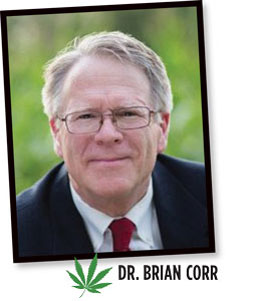11/1/2020
Cannabis & the Voting Booth
Dr. Brian Corr

Depending on when you read this column, the 2020 election in the United States will either be very imminent or just over (although counting all the ballots may take a while). What will the results of this election tell us about cannabis in the United States?
In the case of the presidential and Congressional elections, cannabis laws are way, way, WAY down the lists of reasons voters will support one candidate over another, so it won’t tell us much.
The two leading presidential candidates have approached the issue differently. The Biden campaign put out a specific policy platform related to cannabis. In part it says Biden would “… decriminalize cannabis use and automatically expunge prior convictions …” and “… support the legalization of cannabis for medical purposes …”
The Trump campaign hasn’t put forward an official policy statement related to cannabis. However, during the last almost four years, Trump has consistently been in favor of states’ rights regarding each state establishing its own cannabis legislation. Attorney General William Barr has spoken out in favor of Congress passing legislation so state and federal laws aren’t in conflict.
Regardless who becomes the next president, he can only influence cannabis legislation. More critical is what might happen regarding enforcement of existing federal laws. From the Biden platform and previous statements by Trump, it seems little will change in that regard.
More interesting than the presidential race, at least related to cannabis, are measures on the ballots in some states.
In general, modification of cannabis legislation falls into three categories: decriminalization, medical use and general adult (“recreational”) use.
Decriminalization typically means a person found in possession of a small quantity of cannabis for personal use will receive no criminal penalty at all or may receive a penalty comparable to a traffic violation. About half the states in the U.S. have some form of decriminalization of possession and use of cannabis. In addition, some municipalities have decriminalized possession in conflict with the laws of their states.
There are no state-wide decriminalization measures on the ballot this year, but four villages in Ohio are voting on decriminalization—Adena, Glouster, Jacksonville and Trimble. The four measures are all similar to the one in Jackson-ville: “Shall the Village of Jacksonville adopt the sensible marihuana* ordinance, which lowers the penalty for misdemeanor marihuana offenses to the lowest penalty allowed by the state law?”
Medical use of cannabis is up for a vote in the states of Mississippi and South Dakota. Both states have some peculiarities of their proposals.
In Mississippi, there are dueling proposals for legalization of cannabis for medical use—Initiative 65 and Altern-ative 65A. Voters first vote for passage of either or neither, then must choose their preferred measure should one pass.
Having two measures on the ballot is confusing. Here are the choices voters face:
• Initiative Measure No. 65: Should Mississippi allow qualified patients with debilitating medical conditions, as certified by Mississippi licensed physicians, to use medical marijuana?
• Alternative Measure No. 65 A: Shall Mississippi establish a program to allow the medical use of marijuana products by qualified persons with debilitating medical conditions?
The differences as presented are subtle, however, what’s behind them is quite different. Initiative 65 specifies qualifying conditions, possession limits, tax rate, costs for medical cards, and establishes a deadline for implementation and an administering agency (the Department of Health). Initiative 65A does none of that.
So why are there two initiatives? Initiative 65 sprung from a campaign to put the initiative on the ballot. The alternative is a response from the Mississippi legislature. Depending on who you listen to, the alternative is either a way to confuse voters so nothing passes or a way to ensure the legislature can amend cannabis laws in the future.
South Dakota voters also face an interesting choice. They’ll be asked to approve Initiated Measure 26, which would establish a medical marijuana program for individuals with debilitating medical conditions. However, South Dakota also has general adult use on the ballot. Will voters approve one, both or neither?
In addition to South Dakota, voters in Arizona, Montana and New Jersey will also be voting on general adult use.
In South Dakota, Constitutional Amendment A would legalize the use of marijuana for individuals 21 years old and older. In Arizona, Proposition 207 does essentially the same thing. In New Jersey, it’s Public Question 1—A Constitutional Amendment to Legalize Marijuana.
Montana has a slightly different twist. There are two measures on the ballot: CI-118 would amend the state constitution to allow the establishment of a legal age for possession, use and purchase of cannabis. In Montana, an adult is defined as anyone over 18. Without this measure, cannabis sales could not be limited to persons over 21. The second measure—Montana I-190, the Marijuana Legalization and Tax Initiative—proposes legalizing the possession and use of marijuana for adults over the age of 21.
Voters in all these states, pondering all these measures, will need patience if they’re passed. Once a measure is passed, regulations still need to be drafted for implementation. Taxes, locations for production and sale, types of cannabis allowed to be sold, packaging, etc. are specified in some measures, but not all. Once a measure is passed, various state entities start working setting up the rules. This takes time.
The news on Wednesday, November 4 will be largely about the presidential election, but voters in these locations will have also cast their vote regarding the future of cannabis in their area. GT
*Also an accepted spelling for marijuana.
Dr. Brian Corr is a consultant with more than four decades of experience in the greenhouse industry. He has advised legal cannabis pro-ducers for the last six years. You can reach him at Brian.Corr@SycamoreHortConsulting.com.